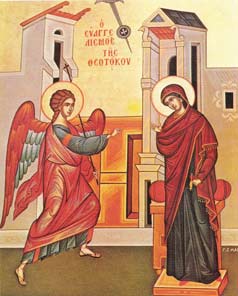March 25
Rejoice, O Virgin Theotokos!
Mary, full of grace,
The Lord is with you!
Blessed are you among women,
And blessed is the fruit of your womb.
For you gave birth to Christ
the Savior and Redeemer of our souls.
The incarnation has always been considered a principal mystery of our faith and was included by the Nicean Fathers in the Symbol of Faith in 325 A.D. (For Jesus Christ “for our salvation, he came down from heaven and was incarnate from the Holy Spirit and the Virgin Mary, and became man.”)
Originally, the Annunciation was considered as a feast of our Lord Jesus Christ, commemorating his incarnation. In the middle of the fourth century a basilica of the Annunciation was built in Nazareth, on a spot where tradition held that the house of the Blessed Virgin stood, and emphasis began to shift towards celebration as a Marian Feast. St. Athanasius the Great (died 373 A.D.) Called the Annunciation the first in the list of feasts, for it begins the work of salvation.
The date March 25 was chosen because it occurs nine months before the Nativity of Our Lord on December 25. In ancient times this presented a liturgical problem, since March 25 normally fell within the Lenten season, during which time festive celebrations were forbidden. But, after the Council of Ephesus in 431 A.D. formally recognized the Blessed Virgin as the Mother of God, Mary’s role in the work of salvation became more prominent.
By the sixth century the Annunciation was recognized as a Marian Feast and was celebrated without exception on March 25, and in 692 A.D. the Council of Trullo overrode previous prohibitions and decreed the Feast of the Annunciation to be celebrated on March 25, even if it coincided with Holy Week. Today, according to Byzantine discipline, we celebrate the Holy Liturgy even on Good Friday, if it happens to fall on March 25.
The Feast of the Annunciation came to the West in the mid to late seventh century. The Council of Toledo in 656 A.D. mentions the Feast as being celebrated on March 25, but transferred it to December 18th. The reason again was that, according to ancient tradition, no feast could be celebrated during the Great Fast. Not until the 11th century did the churches in the West again celebrate the Feast of the Annunciation on March 25.
